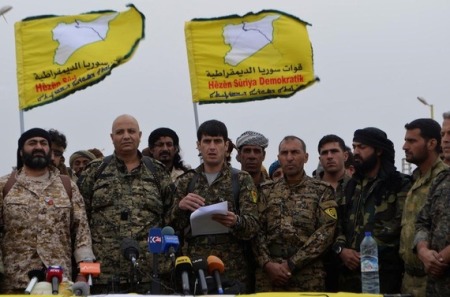Putin ramps up Syria pact with Iran in US absence
Putin ramps up Syria pact with Iran in US absence, DEBKAfile, March 5, 2017

Constantly bombarded by allegations that his campaign associated with Russian intelligence, US President Donald Trump has held back from going through with his original plan for teaming up with Moscow in Syria for the important campaigns of wiping out the Islamic State and relieving Syria of Iran’s iron grip.
His entire Middle East policy is up in the air, while he grapples with domestic foes. The much talked-of US coalition with its regional allies, Saudi Arabia, Egypt, Jordan and Israel, is also in abeyance.
Amid the uncertainty about the Trump administration’s future steps, Prime Minister Binyamin Netanyahu is unlikely to make much headway in his talks with Russian President Vladimir Putin in Moscow on Thursday, March 9,
DEBKAfile’s intelligence and military sources report that, even if does persuade Putin to stick to his promise to prevent Iran and Hizballah from deploying troops on the Syrian-Israeli border opposite the Golan, he won’t get far in his bid to prevent Iran from establishing a permanent military and naval presence in Syria.
This is the situation stacking up against Netanyahu:
1. The Trump administration has decided not to decide on Middle East policy – and Syria, in particular – while engaged in dodging his domestic enemies’ Russian arrows.
2. Some of the president’s advisers maintain that the state of indecision in Washington may turn out into an advantage. It might not be a bad thing for Moscow to carry the heavy lifting of tackling ISIS, Iran and Hizballah, rather than putting US troops in harm’s way.
3. Putin is not waiting for Trump and is already on the move, DEBKAfile’s sources report.
Friday, March 3, Russian special operations units recovered the Syrian town of Palmyra from the Islamic State.
That day too, the Syrian Democratic Forces (SDF), composed predominantly of the Syrian Kurdish YPG militia and Arab tribesmen from the north, agreed to hand over their positions in the strategic town of Manjib to the Russians and the Syrian army,
The SDF was created, trained, armed and funded by the United States as the potential spearhead force for the offensive against the Islamic State. This force was able to last year to capture the small (pop: 50,000) northern town of Manjib, 30km west of the Euphrates, thanks only to US aerial bombardments of ISIS positions and American advisers.
How come that this important US ally suddenly surrendered its positions to the Russians and Assad’s army?
There is more than one reason. Firstly, the SDF’s Kurdish and Arab commanders apparently decided to give up on waiting for Washington to come round, especially since the only weapons they had received from the Obama administration for fighting ISIS were Kalashnikov AK-74 rifles.
Moreover, the Kurds’ most implacable arch enemy is breathing down their necks. On March 1, Turkish President Tayyip Erdogan threatened to order his army, which has occupied northern Syria since last year, to seize Manjib. He said: “Manjib is a city that belongs to the Arabs and the SDF must not be in Raqqa either.”
The Kurdish-Arab force decided to take the Turkish leader at his word. Believing him to be close to Trump, its leaders decided their services were being dispensed with. They saw no point therefore in wasting and risking their troops in battles in the US interest. In this situation, Moscow looked like a better bet.
DEBKAfile’s military sources stress that, when the Russians say they are working with the Syrian army, they really mean the Iranian Revolutionary Guards, the pro-Iranian Shiite militias and Hizballah, because most Syrian army’s units were decimated by nearly six years of civil war, or exist only on paper.
That being so, even if Putin does promise Netanyahu to distance Iranian and pro-Iranian troops from the Syrian-Israeli border, he may not be in a position to honor his pledge. With the Americans far away, they are Russia’s main partners on the ground for achieving his future goals in Syria.
Explore posts in the same categories: Netanyahu, Russia - Middle East, Russia - Syrian war, Russia and Iran, Russia and Trump, Russia and U.S., Syria war, Trump agenda, Trump and Russia, Trump Derangement SyndromeTags: Netanyahu, Russia - Middle East, Russia - Syrian war, Russia and Iran, Russia and Trump, Russia and U.S., Syria war, Trump agenda, Trump and Russia, Trump Derangement Syndrome
You can skip to the end and leave a response. Pinging is currently not allowed.
March 6, 2017 at 12:44 AM
I’m still happy that Hillary isn’t president, but the more I see of the Trump administration, the more I’m reminded of the old Casey quote, “Can’t Anybody Here Play This Game?”
I’m particularly concerned about foreign and defense policy. If Obama fumbled the ISIS problem because of largely ideological issues, Trump is likely to blow it simply because he doesn’t know what the hell he’s doing (along with his closest advisers, of course).
March 6, 2017 at 1:36 AM
I don’t think it’s a matter of Trump knowing what he’s doing. It’s a matter of (a) his concern that any favorable contacts with Putin will exacerbate the Russophobic attacks on his administration and (b) the likelihood that his contacts with Putin withered into practically nothing when Flynn left. I get the sense that Putin no longer trusts the Trump administration to hold their communications in confidence and there are, therefore, few useful communications.
Please see my February 20th article on leaks of highly confidential information.
March 6, 2017 at 4:10 AM
There’s probably truth in (a). As for (b), I think Putin will deal with anyone who he thinks can advance his interests, which are always maintaining his personal power and re-building his country into a significant power (in that order). In any case, Putin is a wily dude who can maneuver rings around most American political leaders.